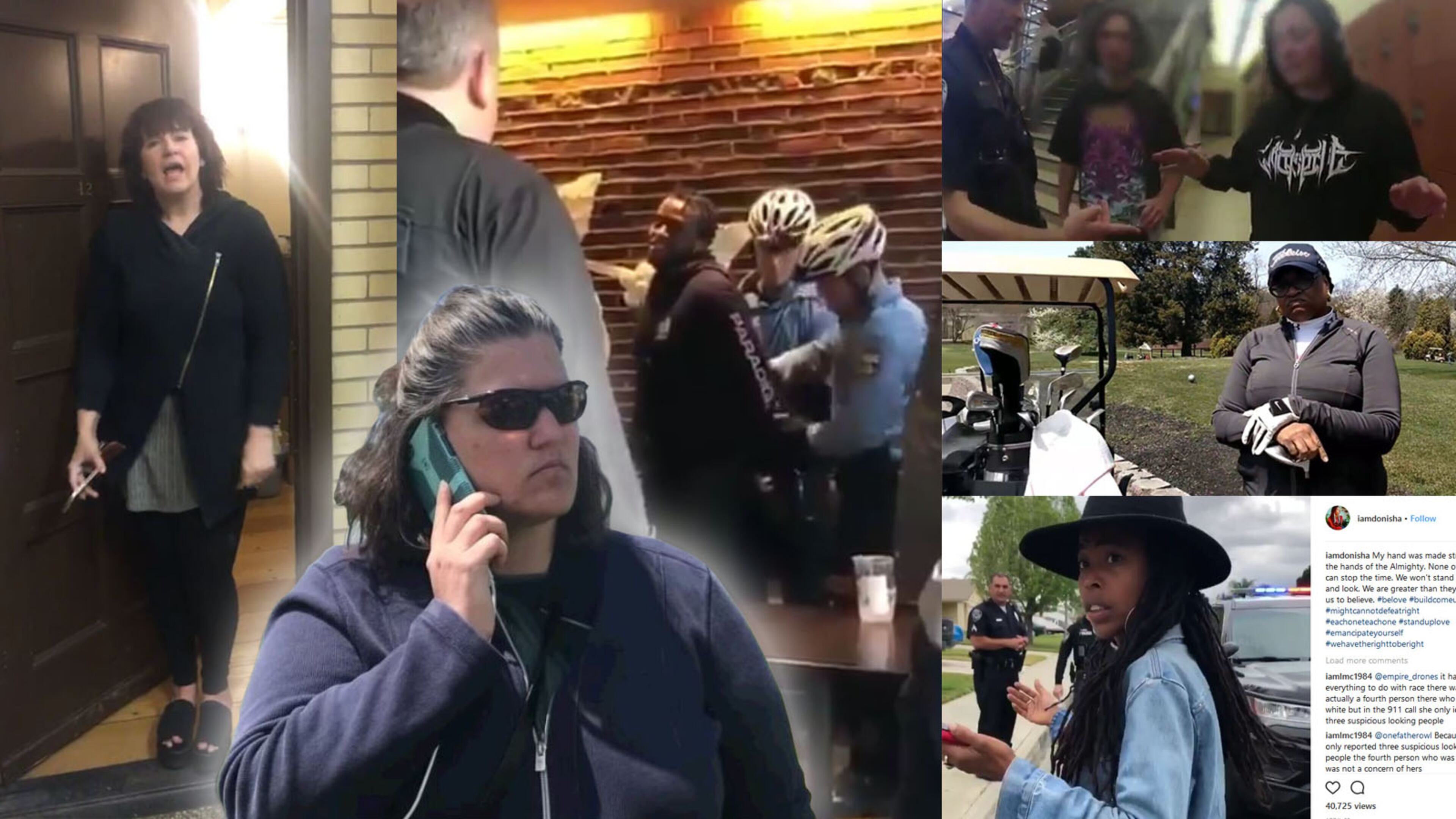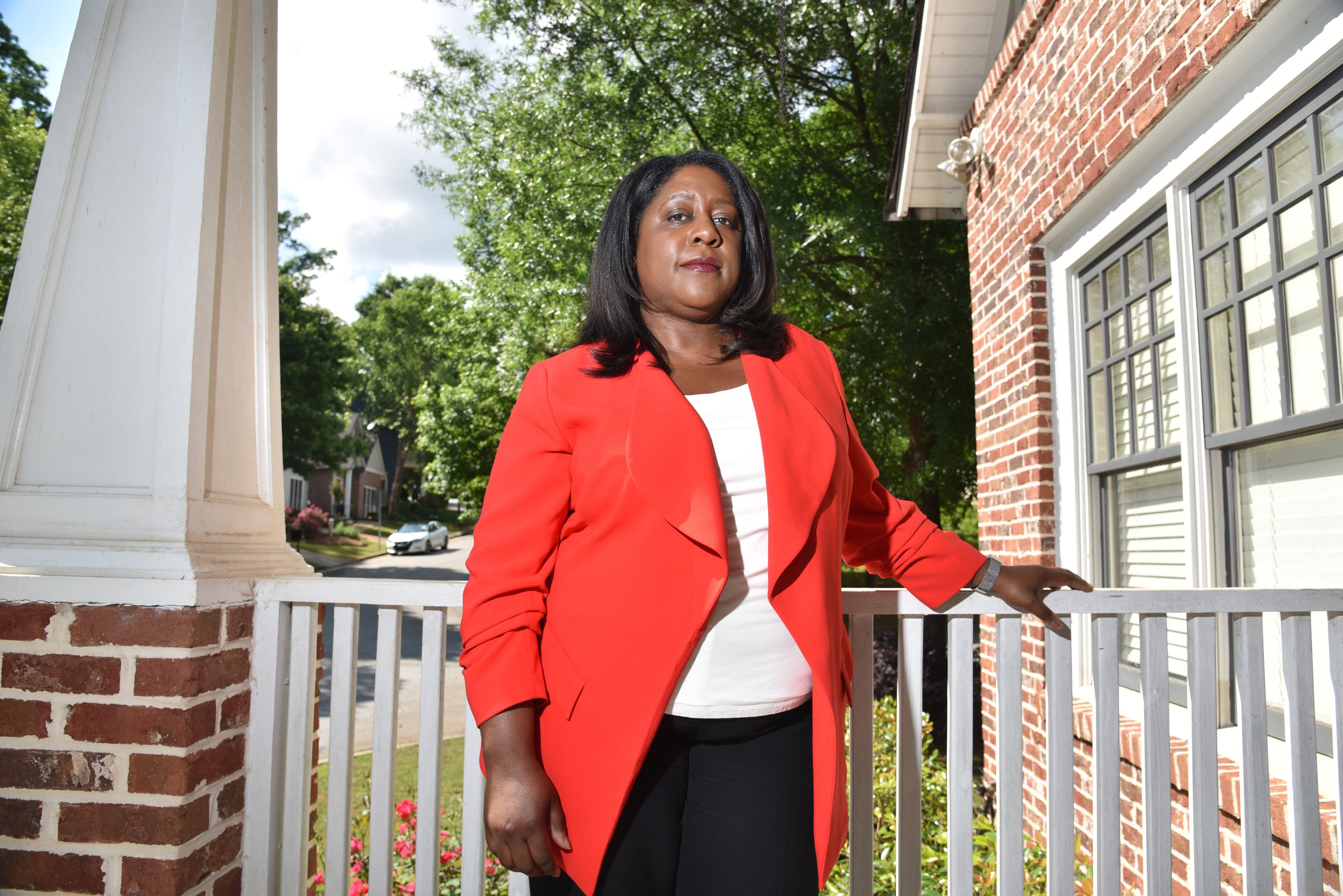
On Ed Garnes’ first day as a doctoral student at the University of Tennessee-Knoxville’s psychology department, someone handed him a trash can. Another time, a white student demanded to know why he was sitting in a classroom 30 minutes early — even though he’d sat across from her all semester.
“That is how privilege works,” Garnes said. “I was invisible to her until I wasn’t.”
Three years into his doctoral program, Garnes’ wardrobe contains a heavy dose of bright orange so he looks like he belongs. But for good measure, along with keeping his school identification and business cards on hand, he now wears a magnetic badge on his chest that clearly states his name, department and the UT logo.
He calls it his “freedom badge,” akin to badges that slaves wore to travel unencumbered through the countryside.
“Despite the overwhelming support of my department, just routinely walking around campus, trying to access buildings, I have been harassed,” said Garnes, who taught at Spelman College for five years prior to enrolling at UT-Knoxville. “I have a student I.D, but I asked for business cards, too. And the badge.”

Garnes’ experiences at one of the largest public schools in the South are stark reminders how African-Americans and people of color have been trying to navigate public and open spaces against what they call white privilege. Over the last month, there have been several high-profile cases, where African-Americans have been accosted or had the police called on them for the crimes of sitting in a coffee shop, barbecuing in a park or taking a nap on a college dormitory couch.
They include:
- Two Philadelphia men who were arrested in Starbucks while waiting for a friend to start a business meeting
- The Yale University graduate student who faced police questioning after a schoolmate reported her for sleeping in a common room in her dormitory
- Three teenagers who were falsely detained for shoplifting from a Nordstrom Rack in Missouri
- Two Native American high school students on a college tour at Colorado State University were interrogated by police because they wouldn't tell a white woman their names
- A group of women, including Bob Marley's granddaughter, who had the cops called on them because they didn't wave to a neighbor while checking out of a Southern California Airbnb
- Female members of a prestigious Pennsylvania country club who had cops called on them because they were playing golf too slowly
In an age where most everyone has a camera phone, most of these incidents were recorded and went viral. One such incident — a white woman in Oakland, Calif. called the police on a black family for setting up a charcoal grill in a park — turned into a hilarious clap back. Thousands of memes ridiculing the woman who dialed 911 have been circulating, and dozens of residents held a "protest" in the form of a cookout at the park.
White gaze and the black body
But all jokes aside, Emory University philosophy professor George Yancy said the examples are coming so fast that he is having a hard time keeping up.
“We already know what it means to be driving while black. Now we know what it means to be sleeping while black,” Yancy said. “There is apparently no public context under which black people will not be perceived as a threat in virtue of being black. It is profoundly insidious and toxic, in American society, that you can’t go into a Starbucks and do all of the things that white people do.”
Rashon Nelson and Donte Robinson settled with Starbucks for an undisclosed sum and with the city of Philadelphia for a symbolic $1 each and a promise from officials to set up a $200,000 program for young entrepreneurs. Starbucks will close all stores the afternoon of May 29 so all employees can undergo racial bias education led by former U.S. Attorney General Eric Holder, Anti-Defamation League CEO Jonathan Greenblatt and other leaders.
"What we are witnessing is not new, but a history of habits that are unfortunately dangerous and violent. That leads to black death." —George Yancy, Emory philosophy professor
Unlike Eric Garner or Philando Castile, two black men who were killed by police officers during routine arrests or traffic stops, no one has died in any of these recent incidents. But the commonness of them might be just as psychologically damaging.
“We see the incidents as isolated, but all of them are the remnants of white supremacy. It is what W.E.B. Du Bois called the ‘psychological wage of white privilege,’” said Garnes, who is getting his doctorate counseling psychology. “It is a privilege to be able to call the police and they come and protect you. This privilege is used by white people.”
Yancy, the Emory professor, said what is happening is the manifestation of white dominance that has been around for centuries. His latest book, "Backlash: What Happens When We Talk Honestly about Racism in America," which grew out of a 2015 New York Times op-ed called "Dear White America," was hit with a barrage of hate mail and death threats.
“It is the white gaze that has historically been the site of violence and violent acts against the black body,” Yancy said. “So, what we are witnessing is not new, but a history of habits that are unfortunately dangerous and violent. That leads to black death.”
Last week, in the wake of rapper Kanye West expressing "love" for President Donald Trump and posing for photos in a Make America Great Again hat, Childish Gambino released his stunning video, "This is America."
In the video Gambino (also known as Donald Glover, the creator and star of the Emmy-winning F/X show “Atlanta”) mocked iconic stereotypes like Jim Crow and buck dancing, to illustrate the racism in plain sight that is often ignored.
»RELATED: The random violence of lynching and how it shaped America
After growing up in public housing in Philadelphia in the 1970s, Yancy is still struck by a comment a police officer made to him as a child. He had just gotten a new telescope and was coming outside to use it for the first time.
A white officer saw him coming through the hallway in the shadows.
“He said to me, ‘I almost blew you away,’” said Yancy, who is still shaken by the memory. ” For him, my telescope became a weapon. He couldn’t envision a black boy having the audacity to want to look at the stars. The white gaze limits the possibility of what you can be.”
“They give you enough to keep you quiet and satisfied”
As a figure skater and now instructor, Sheena Fernandez has been delicately navigating white spaces for more than 35 years. She said she can’t help but wonder if she has missed opportunities to coach, teach or advance because of her race.
“It has been hard. Skating has its moments and can be very selective, but I try to turn a blind eye to prejudices when they could be more direct than I want to acknowledge,” Fernandez said.
Fernandez has been teaching at her current rink in Sandy Springs since 2015. But it was a slow climb. She taught at another Atlanta rink in 2001, but left when she found it difficult to compete to get students.
“They give you enough to keep you quiet and satisfied, but I never felt like I was part of the group,” she said. “That was the first and last time I felt that. I allowed it to engage and indulge me. I had to let it go.”
Yancy said he is pessimistic about change, which worries him since he has four sons.
“America has not had a serious conversation about race in this country and if it didn’t happen under Obama, it is certainly not going to happen under Trump,” Yancy said. “Black people will continue to experience forms of racial profiling and dehumanization in America until I hear a collective prophetic voice capable of standing up and screaming that anti-black racism has to end.”

“Is this because we are black?”
Tjada McKenna is still waiting.
And still shaken by the commotion at her front door caused by a white neighbor confronting a black woman that McKenna was considering hiring as a nanny for her two sons.
Why? Because the white neighbor noticed the nanny, who was with her 21-year-old son, sitting in their car for 30 minutes waiting for her appointment in the tony – and mostly white — Southeast Atlanta cul de sac.
“It was really upsetting and disheartening,” said McKenna, a former Obama Administration political appointee. “It makes me wonder how safe we are when we can’t have a guest come to my home and wait outside without someone approaching them and demanding their papers.”
According to McKenna, who is now an executive with Habitat for Humanity, the nanny candidate arrived early and waited in her car while the McKennas put their sons to bed.
The neighbor spied the nanny’s car, charged it and demanded to know who she was. She then banged on McKenna’s door where she confronted McKenna’s husband, “loud and obnoxious.”
“The nanny finally asked, ‘is this because we are black?’” McKenna recounted.
After the McKennas were able to calm the situation, the neighbor left and they all sat in their living room quietly. The nanny was shaking and appeared traumatized during the interview, McKenna said.
She noticed how the nanny’s son — perhaps fearing the police — remained quiet throughout the whole incident, which especially hit McKenna, as her own sons witnessed the commotion.
“My 5-year-old told me that he didn’t want the police to come. He is already developing a fear of police,” McKenna said. “For my neighbor, for her, this might not be something that she even remembers next week. But the nanny and her son will never forget it. It has a deep impact on people.”
More Stories
The Latest



